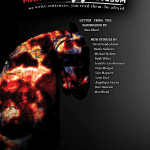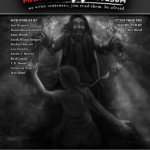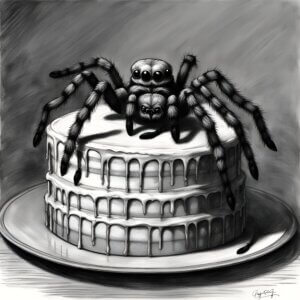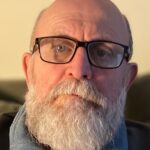Tan kept waking up in the forest. He was sure it was his step-sister’s fault.
If only Sal could have been normal, then maybe Tan might have stood a chance. Their madness might have made sense if they’d shared his mother’s genes — high-strung and always ready to snap. But their father was as plain as could be. Solid job, drove a Volvo, always so calm, even now as he came to the end. There didn’t appear to be a trace of him in either of them.
Tan was only a baby when Sal’s delusions started. He always felt that she blamed him. But then you couldn’t expect any logic or rational thought from Sal. She was fifteen when she took Tan from his cot and disappeared for twelve hours. Their father finally found them in the park. She was cradling Tan under a magnolia tree and giggling furiously, her long white dress caked in mud, her arms and legs scratched by bramble. They brought her back home and sent her to her room where she immediately passed out, exhausted. But then in the middle of the night the crashing and shouting began. She turned her room upside-down, clothes thrown out of the shattered window.
“It’s here,” she muttered. “It followed me back from the forest. I can see it in the cracks. It wants me to suffer.”
At first, they thought it must be drugs. Drink, perhaps—and that would all come in time. There had to be some explanation, it all seemed so out of character.
That was how it began for Sal. They grounded her for a month, chalked it up to teenage hormones. Tan came out of it fine—he was a robust little baby—but it was a scare. And afterward she had been all right for a long while. She had done well at school. Gone to Art College. Had several musician and actor boyfriends that never lasted. Then she started to vanish for days at a time. She was an adult, though. What could they do? She dropped out of College and failed to hold down a string of low-paid jobs.
Tan didn’t understand it until he hit seventeen. That summer he had his heart broken and found himself deep in the forest for the first time.
For him, it started with dark movements in the corner of the room. Strange, disembodied voices. The feeling that there was another world around the corner if he could just push through the fabric of this one, if he could just learn to look at things differently. When the sadness caught up with him, when the pain began to overtake him, moss started to grow on the walls of his room or huge ferns would spring up in the corridors of his College. Long, snaking lianas would reach out to him like tendrils at Swim Club. Things would go hazy, the first creeping vine would wrap around his foot and he would be gone, back to the forest, back to walk alone until inevitably he reached the swamp where it would lever itself out of the muddy waters and drag itself towards him. There was no escape once you were in the forest, no alternative route. God knew he’d tried. Every path led to the swamp and there was no way home until the thing had taken its fill.
Naturally, Tan assumed his mind was going, just like Sal. He tried to tell his mother, but she gabled something about his overactive imagination and shut down right before his eyes. Sal was the only one who could understand, but right when he needed her, Sal vanished again.
It had all slowly unravelled for her. There had been the incident with the injured fox she’d taken in; then she’d tried to break into the bear pen at the zoo… and then she’d gone. A month this time. His parents had listed her as missing, and the Police briefed to prepare for the worst. But Tan had taken his father’s car and found her squatting in a log cabin at the edge of town, half-feral, like some kind of creature of the woods. Rambling the whole time about the thing in the cracks.
He’d brought her home, tried to clean her up, but she was a mess.
“What happened, Sal?” he asked, hoping against hope for a straight answer.
“Same thing as ever, little brother. Same thing as ever. It took me away for a while, that’s all.”
“It?”
Sal tilted her head and looked at him from the corner of her eye. There was a slight upturn at the corner of her mouth which he could almost convince himself was the beginnings of a smile.
“Oh, you know. You know, don’t you little brother? You’ve seen it by now, I’m sure. Pain, Tan. Pain and distress open the threshold to its lair. Don’t you feel it? When you’ve been kicked around by life just enough and the corners start to get dark and those things start to crawl their way across the floor. And then you’re there.”
Tan was going to deny it for a half-second, but then he sighed. “The forest. Is that what you see?”
Sal nodded. “The forest. The dark forest, the fallen, rotted trees. The moss hanging heavy and low, the vines. And-”
“And the swamp.”
“It’s… more like a black pool of oil. The sheen of the light coming through the canopy. Flashes of rainbow. I wonder sometimes, what would happen if I simply jumped in?”
Tan flexed and unflexed his hands. “But it won’t let you, right? You want to fall into the void but it holds you there, balancing on the edge.”
“And then it comes.”
“And then it comes. Long tendrils inch out towards you from that huge mass of sludge and weed, emerging from the water-”
“And after, you wake up, and everything is better. For a while.”
Tan bit his lip and sat down in the wide armchair. His eyes flicked to the corners of the room where the shadows were growing darker. He looked up into his sister’s face and saw her look of serenity. Or was it resignation? The shadows crept further toward him.
“So?” he snapped. “So we share the same delusion. You probably put the idea in my head when I was younger. You really messed me up, you know.”
“It’s real,” Sal said and rolled up her sleeve. Her forearm was covered in deep red welts, as though she had been lashed. “This is where it grips me.”
“They’re just track marks, Sal. Needle pricks and infections from dirty needles. That’s all.”
“Really? Well, then why don’t you show me your arms, my saintly little brother?”
Tan rolled up his own sleeve, looked at his own scars and then looked away.
“I don’t know what I know. But what does it matter? What do you want me to do about it?” Tan’s eyes flicked to the corners of the room, things were moving in the shadows. Sal followed his gaze. “I see it, too,” she said. “The creeping vines, coming for you, dripping with black water. Spiderwebbing their way up the walls, fine enough to be cracks in the plaster at a distance.”
“I can’t help you, Sal. I’m not strong enough. We’re not strong enough. I can’t go there and fight it with you.”
“Fight it? Fight it?” Sal laughed in his face and Tan shrank back into his chair. “Oh, my poor little brother. I didn’t realise. You don’t know, do you? At first, I thought it wanted me to suffer, too. I thought it wanted me to feel pain, I thought it wanted to hurt me. But that’s not right, Tan. It heals.”
The darkness closed in on them and they were gone again.
#
“Sal? Sal, are you here?”
Tan walked through the forest. The trees were long, straight things that shot a hundred feet up into the air like missiles. Pines? Redwoods? He didn’t know. They blotted out the sun and below all was shadow where moss covered the ground and ferns grew tall. The place had a primeval feel, insects buzzed around his head and moisture dripped from bark and leaves. The ground was muddy underfoot. He walked, but he knew it didn’t matter which direction he took.
“Tan?”
He heard Sal’s voice off to the left. It wasn’t urgent, or loud. It was calm and beckoning. He followed it into a small clearing and stopped dead. He opened and closed his mouth a few times as he took it all in.
“Sal? Sal… what is this?”
“Well, what does it look like, little brother? Come inside.”
Sal stood on the porch of the log cabin and held the door open. The cabin was furred with green lichen, ivy wrapped its beams and through its open windows. It almost melted into the forest and he could have walked past it if he hadn’t seen his sister. It shouldn’t have been there, not in that place. Wherever the forest existed, it was not a place for houses, cabins, huts, or sheds. Not a place for a human to dwell.
Inside, Sal gestured for him to take a wicker chair. He stood.
“I don’t understand. Where did this come from? Who built it?”
“I built it, silly. It helped me. I’ve spent so much time here, that it wanted me to be comfortable.”
“Why?”
“I told you, it heals. Now come on, you know there’s no other way out of here than through. Let’s go find the swamp.”
The walk to the swamp could be twenty paces or it could be ten miles. It was always the worst part. With every step, his head seemed to grow heavier, his legs stiffened and his mind became hazy. All the thoughts would crowd back in. The thoughts that had first brought the darkness on. If he was angry, the reason for his anger would fracture, multiply, exaggerate and magnify. If he was lovesick, the object of his affection would scorn him from the treeline, would laugh in his face and dismiss him a hundredfold. The greater the injury, the longer the walk. Sal had been gone for a month, and he wondered how much of that time she’d spent walking through the woods alone.
They reached the swamp after an hour, or so he guessed. It was difficult to calculate time in the forest.
The oily surface glistened at their feet and they waited.
“So… I’m supposed to just go on like this? For the rest of my life? Can’t we… do something?”
“The swamp isn’t the cause of my illness, Tan. It isn’t even a symptom. It’s the cure.”
“You could try-”
“Medication? Therapy? Maybe they would work, maybe they wouldn’t. I know this works. It’s a gift, little brother. You have to embrace it.”
The dark mass broke the black surface and slowly rose from the depths. An acrid smell came with it, part rotting vegetation part sulphur. The thing didn’t have eyes, a nose, a face or any recognisable body part. It was an amorphous mass that rolled and changed and crawled its way forward. When it grew close enough, a gaping hole opened at its centre, and sludge-covered tendrils emerged, covering the ground. They crawled toward him and latched onto his arms, holding him in place. There was a yawning sound like a huge iron door swinging open and the draining began.
#
Tan came round, the ringing of a great bell tolling in his ears.
His phone. Just his phone.
His mother screeched down the line, hysterical. He looked around but couldn’t see Sal anywhere.
“He’s going, Tan. Your father. Where the hell are you? Get to the hospital, now.”
“Is Sal there?”
“Sal? No, of course not. Don’t be ridiculous. That’s the last thing he needs now, to have her upsetting him.”
“Sal should be there.”
“Shut up Tan. Just get yourself here. It’s bad enough you doing whatever the hell it is you do. God, the two of you…” She said, voice straining and cracking, “What did he do to deserve two such…such…”
Tan hung up. She was right. What had his father ever done to deserve them?
He wrapped his huge, wax leather jacket around himself for warmth. It was his one prize possession. His father had passed it on before the illness started to waste him away. Tan couldn’t imagine him wearing it, it seemed to hint at a different man, somewhere back in the past.
An hour later, his mother met him outside the hospital smoking a cigarette. She looked terrible. She’d lost weight, she was pale, and her hair was stringy and unkempt. She gave him the room number but barely spoke. She wouldn’t meet his eyes and wouldn’t come in with him.
The nurse caught up to him along the corridor. She was a small woman who seemed to be carrying the weight of the world on her shoulder.
“Your father, I’m sorry. It’s only a matter of hours. You should prepare yourself. He is not conscious or aware of his surroundings, but it would bring him comfort to hear your voice.”
“Thank you,” Tan said. It didn’t seem anywhere enough.
She ushered him in and Tan looked around the room. His father was alone. He looked tiny in the pristine bed. He took a seat and held his father’s hand. The machines beeped rhythmically, and he began to feel his eyelids droop.
The room, bright white and spotless before, seemed to darken, as though someone had hit the dimmer switch. Tan blinked and the room grew bright again.
His father groaned and his eyes opened slightly.
“Tan.” It was a voice that had been sandblasted.
“Here, Dad. I’m here.”
“Where is Tan?” The voice was a growl. The room closed in on him. Not now. Not now. This was not how he wanted to remember his father, not as one of his episodes.
“I’m here, Dad. It’s me.”
“What did you do with Tan? Sal, where is Tan? You stupid little girl.”
Delirious, he must be delirious. His mother said this might happen. He was lost in time somewhere.
“Dad? Dad? What are you talking about?”
His father coughed and groaned and fidgeted, as though his body and mind were fighting each other. A smile came over his face and his voice became smoother. “The pain. It’s gone. Heqet heals me.”
Tan wrinkled his brow. “Heqet? Is that what they’ve got you on? Some kind of painkiller?”
“In a manner of speaking. Heqet. Goddess of the swamp.”
Tan’s stomach lurched. “The swamp?”
His father didn’t hear him, or if he did, he ignored him. “When Sal was born I became the dullest man I could imagine. No highs, no lows. I didn’t find myself at the swamp for twelve whole years. And then… and then Sal started to… well, you know. Then it was both of you. You’re only as happy as your saddest child.”
Tan clasped his father’s hand and tried not to look into the corners of the room. His voice rose, as if trying to scare the growing shadows away.
“You know about the thing in the swamp and you didn’t tell us? What is it? Sal says it heals her, but that can’t be-”
His father shook his head slowly. His bottom lip hung thick and puffy in one corner of his mouth. His eyes were barely there any more.
“Not heal… it just takes the pain away, but it takes something else, too. For Sal, it’s her sanity. Every time it heals her, it takes a little more. And the more it takes, the more often Sal finds herself back in the forest. For me, it’s my health. I’ve tried to fight it, but the pain… it can be unbearable, and that’s when I find myself going back there. But when it takes the pain, the tumour grows a little bit larger. What it’ll be for you… I don’t know.”
Tan looked at his father, emaciated and wincing in pain with every movement and every breath.
“Can… can I stop it at all?”
His father shook his head, his voice faded to a whisper. “The Goddess must have tribute.”
Tan focused on his father’s face. He could sense the room fading away, he could feel the cool, air of the forest on his face and the green smell of vegetation eddying through the hospital room. If he just focused on his father’s face, it wouldn’t take him. Not here, not in his father’s last moments.
He squeezed his eyes shut, opened them again and the bed—formerly austere, hospital-regulation-basic—had grown, had become something living. A great tree, spreading its branches and wrapping around his father, cradling him. A look of peace crossed his father’s face, he reached out and took hold of Tan’s hand. The bed seemed to move and Tan watched as a great branch grew before his eyes, through the wall and straight through the ceiling. It punched a hole and the room juddered, plaster rained down on the bed. His father smiled and they were gone, deep in the forest, standing together at the edge of the swamp.
“Heqet,” his father said and the surface of the water broke. The lump of mud and vegetation that was the Swamp Goddess waited. “Heqet, this will be my final tribute. I am going to die.”
The mass seemed to weigh this up for a moment.
“My son does not wish to pay you tribute any longer.”
Heqet began to vibrate gently and advance towards them at a glacial but inexorable pace. Tan felt his feet set in stone, the same way they always did. Wet tendrils began to unfurl from the dark recesses. His father began to chuckle gently.
“I tried, son. But I told you, she hungers for more tribute.” He turned to him and smiled. “Goodbye, Tan.”
Heqet enveloped him in its creeping tendrils and Tan could see the drain begin, he watched the life die in his father’s eyes and knew that the thing would never be satisfied, would never have enough tribute of pain and suffering.
“Wait,” Tan said. “Wait. I can lead more here to you… I can lead them to this swamp—people in pain, people in despair, people suffering. I will be your missionary. I can bring you tribute if you leave my sister and I alone.”
Heqet left his father in a heap on the shore of the swamp, his face static and half-buried in the mud. He was gone, motionless, an empty shell. A toy robot with its batteries removed. Inanimate. The mass oozed towards Tan then stopped, paused and slid back into the swamp.
Tan woke to find he was clutching his father’s cold hand.
#
“It’s so good of you to do this,” the nurse said. She was a pretty young thing and Tan was working up the courage to ask her out. “We get the occasional volunteer. Usually, there’s some ulterior motive. But not many choose end-of-life palliative care. And I don’t know what you say to them or do, but they seem to brighten up after you leave. They feel better, and their vitals improve, for a short time at least.”
“I just read to them, is all. Sometimes I tell them stories. It sounds silly but… no.”
“Go on,” the nurse encouraged him, placing a hand on his shoulder.
“Well, my mother always told me when I was in pain to think of my happy place. When my sister and I were growing up, we used to spend a lot of time in the forest and I guess I could describe just about every tree in that place, the log cabin… the swamp. It was so calm, so quiet, you know? I guess I can describe it so well that maybe it’s like being there for a short while at least. I hope they find it peaceful.”
T. K. Howell (he/him) lives on the banks of the Thames and manages ancient oak woodlands and tends to trees that are older than most countries. His writing is often inspired by mythology and folklore and can be found at various genre and literary spaces including Lucent Dreaming, Mystery Magazine, Dark Horse and Indie Bites.











